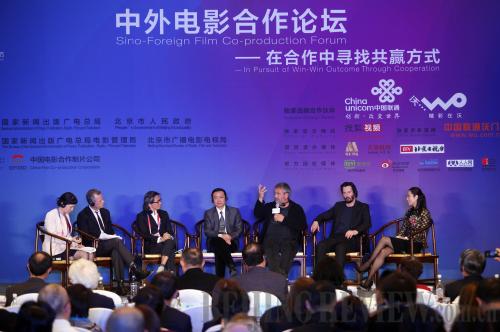|
 |
|
FOR COOPERATION: Famed international movie makers including Luc Besson (third right) and Kenu Reeves (second right) talk about their film experience in Beijing on April 21 (XINHUA) |
The actor has long been an ardent admirer of Chinese kung fu, ever since working with local stuntman Chen Hu and action director Woo-ping Yuen, now close friends, on The Matrix series. It was Chen who first suggested they produce a film together five years ago.
"While reading the initial script, based on a modern man with a traditional background, I got pretty excited and wanted to tell the story from my own perspective as director," Reeves explained.
"As the leading character hails from Beijing, it was only logical to co-produce the film in China," he added.
The most difficult thing a co-producer faces is sourcing a script that would appeal to a culturally diverse audience, said Wang Zhonglei, President of Huayi Brothers Media Corp., a leading film company in China.
"Sometimes, culture and language serve as obstacles to the success of a co-produced movie," he said at the film festival on April 20.
"Even Crouching Tiger Hidden Dragon, directed by the famous Ang Lee and very successful in the United States, saw mediocre returns in China," Wang said.
Audiences in the United States are used to watching kung fu movies with Westernized storylines that seldom appeal to cinemagoers in China. This has led to various co-productions experiencing varying results both at home and abroad, Wang said.
"There is an obvious difference between American and Chinese perspectives. It is a gap that is hard to breach, but we must try," he added.
In turn, a successful Chinese production might not always quite hit the spot in the States. The Chinese comedy Lost in Thailand broke local box office records by earning nearly 1.3 billion yuan ($210 million) since its debut in December last year, but made no waves in the United States.
"One of the reasons Lee's movies do so well in the United States is that they happen to be in English," Ganis said. "People in the States, and other English-speaking countries, are sadly not as open to foreign language films as they should be."
However, films such as Kung Fu Panda do manage to transcend cultural barriers. As an animation, language can be adjusted quite easily, Ganis explained.
The success of Kung Fu Panda in both the United States and China can also be attributed to its simple storyline, funny animal characters, fine pictures and lots of stunning kung fu scenes. With regards to developing such movies, the Chinese industry still has a long way to go.
A resonant film depends on a good storyline, Paul Hanneman, co-President of 20th Century Fox International Theatrical, speaking at the Sino-Foreign Film Co-Production Forum during the film festival on April 22.
"Normally our films blend multicultural and universal values for a global audience," Hanneman said.
Surely things get better if there are big movie stars. The promotion procedure is also important in terms of producing a good trailer while post-production adds additional weight to a project, Hanneman said.
"Chinese production companies dream of bringing local stories to global audiences and are exploring better ways to do so," Dan said, "It is a step-by-step process."
Hollywood reflects a mature film industry. Chinese movie makers can learn a lot from their U.S. partners through film co-production, Dan stressed.
Email us at: baishi@bjreview.com | 